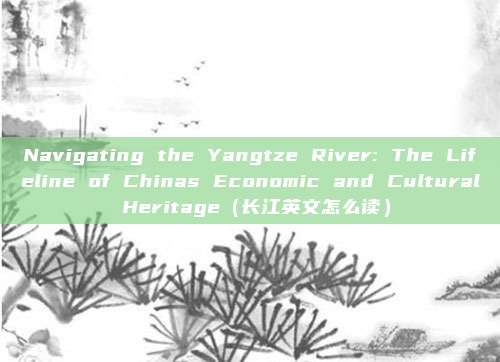Navigating the Yangtze River: The Lifeline of Chinas Economic and Cultural Heritage(长江英文怎么读)
温馨提示:这篇文章已超过217天没有更新,请注意相关的内容是否还可用!
The Yangtze River, known as the "Golden Waterway" in English, is not just a geographical feature but a cultural and economic artery of China. Spanning over 6,300 kilometers, the Yangtze is the longest river in Asia and the third longest in the world. Its significance to China is both profound and multifaceted, as it has shaped the landscape, history, and identity of the region for millennia.
Economic Powerhouse
The Yangtze River Economic Belt, as recognized by the Chinese government, is a strategic economic zone that encompasses the entire length of the river. This area is a major industrial base in China, with industries such as steel, petrochemicals, and shipbuilding flourishing along its banks. According to the China Statistical Yearbook, the region accounts for more than one-third of China's GDP and nearly half of its industrial output.
One of the most impressive developments along the Yangtze is the Three Gorges Dam, the largest power station in the world by installed capacity. This engineering marvel, completed in 2012, generates about 22.5% of China's total hydropower output and provides a significant boost to the country's electrical grid.

Cultural and Historical Significance
The Yangtze River has been a witness to China's rich cultural heritage. For centuries, it has served as the backdrop for many Chinese tales, legends, and poems. The river is deeply embedded in the national psyche, symbolizing strength, endurance, and unity.
Notable historical sites along the river include the ancient city of Chongqing, which has been a strategic military and commercial center since the Sui Dynasty (581-618 AD). The river also played a crucial role in the history of the Three Kingdoms period (220-280 AD), and the Battle of Red Cliffs, one of the most famous battles in Chinese history, took place there.
Environmental Challenges and Conservation Efforts
Despite its many contributions, the Yangtze River faces several environmental challenges. The rapid industrialization and urbanization along its banks have led to pollution and habitat degradation. In a report by the China Environment News, it was noted that the water quality in the river has declined significantly in recent decades.
Recognizing these issues, China has embarked on extensive conservation efforts. The government has implemented stricter regulations on industrial discharge and has launched a series of programs aimed at preserving the natural environment of the river. One such initiative is the Yangtze River Economic Belt Green Development Plan, which focuses on balancing economic development with ecological conservation.
Impact on Local Communities
The Yangtze River's importance is not confined to industrial and historical aspects; it deeply impacts local communities. Fishing communities, for example, have thrived along the river, relying on its rich biodiversity for their livelihoods. However, with environmental degradation, these communities are increasingly facing challenges in maintaining their traditional way of life.
The government is taking steps to address this issue. Programs are being implemented to provide alternative livelihoods and support the transition of these communities to more sustainable practices. The goal is to ensure that the benefits of the Yangtze River are shared equitably and that its ecological health is maintained for future generations.
Conclusion
The Yangtze River, with its economic might, cultural heritage, and environmental challenges, remains a critical component of China's identity and development. As the country continues to navigate the complexities of modernization, it is essential that the river's economic and ecological benefits are harnessed in a balanced and sustainable manner. The Yangtze River Economic Belt holds immense potential, but it must be guided by careful planning and a deep commitment to conservation.
In conclusion, the Yangtze River, or the "Golden Waterway," continues to be a living testament to China's rich history and vibrant future. Its waters flow not only through the land but through the very heart of Chinese society, reminding us of the river's enduring role in shaping the destiny of a nation.
网站文章、图片来源于网络,以不营利的目的分享经验知识,版权归原作者所有。如有侵权请联系删除!





还没有评论,来说两句吧...